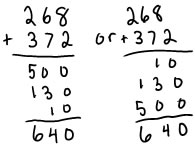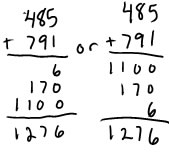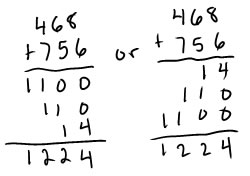


Addition
The only formal algorithm I want you to know in addition to the standard algorithm is the expanded algorithm. Please practice the expanded algorithm for these problems:
 |
 |
 |
You should also know how to solve two digit addition problems by rounding and compensating. Please use the rounding and compensating (friendly numbers) or make 10 strategie(s) for these problems:
| round and compensate | make 10 | |
| 4. 48 + 87 | 50+90=140 |
Give 2 from 87 to 48 to get 50 + 85 = 135 |
| 5. 69 + 72 | 70 + 70 = 140 140 - 1 = 139 139 + 2 = 141 |
Give 1 from 72 to 69 to get 70 + 71 = 141 |
| 6. 32+49 | 30 + 50 = 80 80 + 2 = 82 82 - 1 = 81 |
Give 1 from 32 to 49 to get 31 + 50 = 81 |
Subtraction
I want you to be able to use the trade-first strategy for subtraction, and be able to figure out the exchanges in both left to right and right to left order. For each of these problems, solve by the trade first strategy a. writing the trades in left to right order, and b. writing the trades in right to left order.
7. 743 - 297
|
Notice that the difference show up in how the trades are marked in the tens column. When the trades are done left to right, 4 tens is first made 14 tens, and then is made 13 tens. When the trades are done left to right, 4 tens first becomes 3 tens and then 13 tens. |
8. 3429 - 1735
|
In this case the difference between the two methods is only visible in the trades made in the hundreds column. |
9. 406 - 328
|
In this case there is no difference between the two methods because it's not possible to make the trade in the right to left order. |
You should also be able to use the negative numbers strategy, since that's one that is natural to a significant number of children. Please use the negative numbers strategy to solve each of these problems:
10. 84 - 27 = 60 - 3 = 57
(80 - 20 is 60 and 4-7 is -3, and then 60 - 3 = 57)
11. 723 - 176 = 600 - 50 - 3 = 550 - 3 = 547
(700 - 100 is 600, and 20 - 70 = -50, and 3 - 6 = -3; then 600-50 = 550 and 550 - 3 = 547)
12. 748 - 281 = 500 - 40 +7 = 460 + 7 = 467
(700 - 200 is 500, 40 - 80 = - 40, and 8 - 1 = 7; then 500 - 40 = 460 and 460 + 7 = 467)
And finally, I would like you to practice the round and compensate (friendly numbers) strategy for these problems:
13. 90 - 28
90 - 30 = 60
60 +2 = 62
14. 70 - 32
70 - 30 = 40
40 - 2 = 38
15. 92 - 28
90 - 30 = 60
60 + 2 = 62 (because 92 is 2 more than 90)
62 + 2 = 64 (because taking away 30 is means that you've taken away 2 too many)
16. 69 - 32
70 - 30 = 40
40 -1 = 39 (because 69 is one less than 70)
39 - 2 = 37 (because taking away 30 is only part of what you have to take away, you still have 2 more you need to take away)